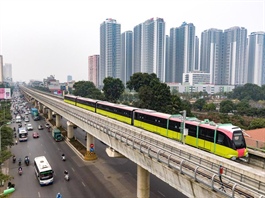Demand for talent in Vietnam’s e-commerce to surge rapidly
Demand for talent in Vietnam’s e-commerce to surge rapidly
Hanoi has set a goal to train 2,000 companies and home business owners, civil servants and students in e-commerce skills this year.
With the growing development in e-commerce, the demand for human resources in Vietnam is on the rise and forecasted to surge faster in two- or three-year time, according to local insiders.

The number of online shoppers has sharply increased after two years of the pandemic. Photo: The Hanoi Times |
The explosive growth of e-commerce has led to an increase in the demand for talents. Especially, after two years of the pandemic, the number of online shoppers has sharply increased. In the current context, local businesses are actively implementing digital transformation and promoting their activities on e-commerce.
According to the Vietnam E-commerce Association (VECOM), the demand for recruiting high-quality e-commerce human resources in the 2016-2020 period increased rapidly and is predicted to continue to rise even faster during 2021-25.
Nguyen Thanh Hung, former Chairman of the VECOM, emphasized the huge demand for recruiting e-commerce personnel. “Businesses and members of the Association are constantly hiring personnel and the recruitment is very strict,” he said.
According to Nguyen Tran Hung, Head of the Faculty of the Economic Information Systems and E-commerce (the Trade University), e-commerce is the field of promoting entrepreneurship. “Students, after graduating, often set up their own e-businesses and find personnel, further intensifying the demand for human resources".
A representative from Lazada added retail businesses, which are digitally transforming and shifting business to e-commerce, are also in need of hiring.
The latest E-Commerce Index report from the VECOM has highlighted the high-quality human resources of e-commerce in millions of small and medium enterprises as well as business households across the country as one of the decisive factors for the rapid and sustainable development of e-commerce in Vietnam in the coming time. The main channel to train professional and high-quality e-commerce human resources is universities, the report noted.
Vice President of the Thuongmai University Nguyen Thi Bich Loan, said for many years, e-commerce is one of the top industries for hiring new graduates.
A recent survey showed that 95% of graduates from Thuongmai University have found jobs over the years, she added.
The school has collaborated with more than 130 universities to survey the current status of e-commerce training in higher education institutions, including teaching, learning materials, and the level of cooperation with businesses to ensure the employer’s requirements.
Before 2016, about 23% of educational establishments offered training in e-commerce which includes digital marketing, e-payment, online payment, and supply chain logistics. The figure increased to 28% and 49% in 2020 and 2021, respectively.
According to the report, out of 132 surveyed schools, there are 36 offering training at the bachelor’s-degree level, another 36 teaching e-commerce as a major, and 53 providing e-commerce courses.
Hung shared, "Some students even get jobs while they are still in their 3rd year. This reflects the huge hiring demand in this industry now and in the future."
Weakness in training
However, one of the challenges in e-commerce training in universities is a shortage of lecturers, according to Nguyen Thanh Hung, former Chairman of the VECOM. While the e-commerce industry develops too fast, the teaching staff at universities is insufficient in number.
Besides, the learning materials for e-commerce training have not met the requirements. “Up to 67% of universities use the foreign curriculum. The cooperation in e-commerce training is still weak in all forms, whether it is a cooperation between universities, between universities and regulatory agencies, scientific research institutions, professional social organizations, or between schools and businesses,” he added.
To achieve the goal of 50% of higher education and vocational institutions offering e-commerce training according to the master plan for national e-commerce development for the 2021-25 period, Hung underlined, that the universities need to increase staffing levels and qualifications of lecturers.
Local experts believed that it is necessary to establish a network of e-commerce training institutions to build teachers' capacity, share teaching methods, and quickly improve the quality of e-commerce learning materials as well as promote career-oriented activities, and business linkages.
|
Hanoi has set a goal to train 2,000 companies and home business owners, civil servants, and students in e-commerce skills this year, according to Plan 04 on the city’s e-commerce development in 2022. The city targets business-to-consumer (B2C) e-commerce sales to account for 11% of the total retail sales of consumer goods and services in the city. Cashless payment in e-commerce is expected to reach 45%. The city also aims to remain 2nd nationwide or climb higher in the annual E-Commerce Index (EBI). About 75% of total trading websites will integrate online ordering functions as well as 45% of small and medium enterprises will provide e-commerce services, including through social networks and e-commerce platforms. Some 35% of businesses will be encouraged to participate in e-commerce activities on mobile applications. Hanoi also focuses on developing e-commerce infrastructures including electronic payments in public services, logistics, and delivery services as well as applying new technologies which help connect logistics activities between the city and other provinces and cities across the country. |


























